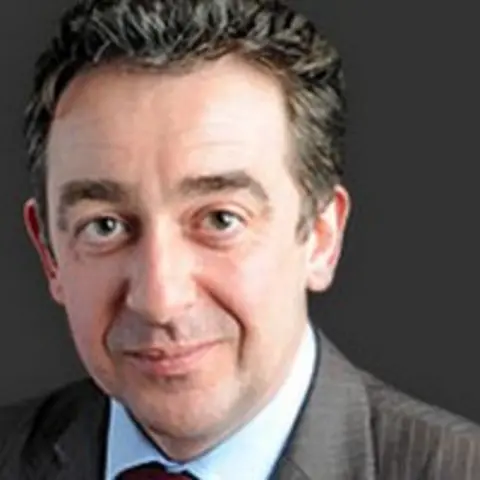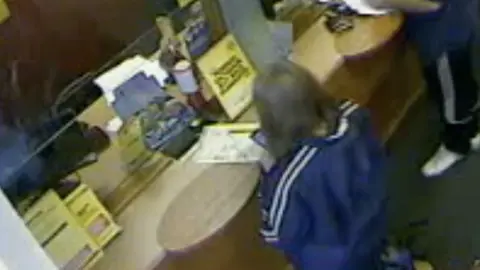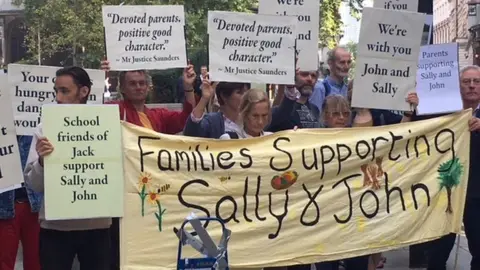Jack Letts: Why jihadi's parents are guilty of funding terrorism

 PA
PAA former charity fundraiser and an organic farmer have been convicted of funding terrorism by sending cash to their son in Syria. So how did Sally Lane and John Letts end up before a jury in the Old Bailey?
In the words of one judge, they were "two perfectly decent people... in custody because of the love of their child".
And over four years, Lane and Letts battled to avoid trial for sending cash to their son, who had joined the war in Syria and the Islamic State group.
But now they have both been found guilty of a serious terrorism-related offence after a trial that came down to evidence of foreseeable consequences.
Jack Letts converted to Islam as a 16-year-old. His parents had supported his decision.
But two years later in May 2014 evidence began to emerge that he was associating with extremists. He married Asmaa, whose family were influential in IS in Iraq, and they had a child together.
A fellow Muslim who knew Jack Letts in Oxford warned his parents their son wanted to go to Syria.

Jack Letts, who is now 23, told his parents he only wanted to study in the Middle East and they decided to fund his travel.
But they were not sure what he was up to. Evidence from their trial reveals that Lane confided in a friend that she believed her son might be seeking to join the war - but both she and his father appeared to hoping for the best.
In late August the truth dawned. Lane emailed a friend to say her son was in the "worst" possible country, a message sent two days before the beheading of James Foley, the first western hostage to be murdered by IS.
And Jack Letts finally confirmed to his parents on 2 September 2014 that he was in Syria and later exchanges made clear he was alongside other IS group recruits from the UK in the group's capital Raqqa.
'Do martyrdom operation'
By March 2015 counter-terrorism detectives were investigating Jack Letts and they advised his parents not to send him any cash. Quite simply, it would probably end up in the hands of the terror group and wiring money in such circumstances was a crime.
During the trial the jury heard that Jack Letts has obsessive compulsive disorder and his parents believed his decision to go to Syria was influenced by his condition.
But to others, he had appeared to have become a fully signed-up member of an extremist sect. In one Facebook post he declared he'd like to "do a martyrdom operation" against a school friend who was in the Army.
 CTPSE
CTPSEWeeks later he was bragging to his mother about the "Islamic State Health Service", a key piece of propaganda that the group's UK recruits were encouraged to promote.
And so when he began to ask for cash, he was playing on his parents' turmoil.
He repeatedly asked Lane to send money to an intermediary in Turkey or Lebanon whom she did not know. He claimed it would not go on "jihad" but advised her to come up with a cover story.
Despite her reservations, the trial heard Lane and John Letts agreed to the proposal and in September 2015 she wired £223 to her son's contact in Lebanon.
She hoped any cash she sent her son could help him survive or escape. But the transfer led to a second warning from the police not to send any more.
In relation to this transaction, the couple were convicted by a jury at the Old Bailey of entering into a funding arrangement for the purposes of terrorism.
They were each sentenced to 15 months imprisonment, suspended for two years.
As the winter wore on, Jack Letts was sending conflicting messages. On the one hand he said the West should "die in their rage". He also began to suggest he was doubting IS beliefs and wanted to return home.
His parents pressed further, and Jack Letts again asked for cash, suggesting smugglers could help him to get out.
By now it was not just the police warning the couple not to send anything. Two independent experts, an academic and a professional deradicaliser, also advised the couple not to send money.
Then, on 27 December 2015, a junior police officer, acting as a liaison with the family, made a mistake. That officer said money could be sent if it were to aid their son's escape.
Two days later, case officers corrected the error in a meeting with Lane and John Letts, backed up with a written notice that sending cash would be a crime.
Despite that formal advice, effectively a third warning, on New Year's Eve Lane tried to send £1,000 to her son's nominated intermediary in Lebanon.
The payment was blocked. Four days later, the trial heard, that Sally Lane used a false identity to try again to send £500. Again, the payment was blocked.
The jury cleared the couple of funding terrorism by attempting to send the £1,000 payment and were unable to reach a verdict in relation to the third attempted transfer.
'Law misinterpreted'
The case has been one of the most drawn-out terrorism prosecutions in recent history - including the almost 20 hours the jury took to reach verdicts.
No jury could be asked to find Sally Lane and John Letts guilty of supporting terrorism - because there was no evidence they supported banned violent groups. It was clear from their own emotional arguments with their son how deeply disgusted and shocked they had been by his decision.
But at the same time, they wanted to help him come to his senses and find a way out.
 Facebook
FacebookThe question for the jury would be whether sending cash for that purpose broke the law which bans the funding of terrorism in any circumstances.
That law, Section 17 of the Terrorism Act 2000, states that it is a crime to enter into a funding arrangement if someone either knows or has "reasonable cause to suspect" that money could end up in the hands of terrorists.
When the offence was originally created in 1976, prosecutors had to prove the defendant either definitely knew for sure or suspected the cash was going to fund terrorism.
But Parliament later changed the wording to include situations where people would merely have had reasonable cause to suspect where their cash was heading. This, in effect, lowered the evidential test to find someone guilty.
As the case approached trial, the couple asked the Court of Appeal to rule that the law was being misinterpreted - a challenge that could have stopped the prosecution. During the hearing in 2017 they argued they could not be accused of funding terrorism if they honestly did not believe their son would ever hand money to a banned terror group.
Their aim had been to try to rescue him, to save his life, and therefore they could not be prosecuted for funding a terror group.
Those senior judges rejected that appeal and that decision was backed a year later by the Supreme Court.
Similar cases
If Jack Letts had successfully covered his tracks, his parents would never have committed a crime because they would have had absolutely no idea what he was up to.
However, there was ample evidence of where he was, who he appeared to be with and what he had been doing.
The jury had to decide whether the couple knew enough about their son's situation to reasonably suspect cash might end up in the pockets of IS fighters, even if they genuinely hoped that it would not.
In opening the trial, prosecutor Alison Morgan QC said jurors would inevitably have sympathy for the parents but the law was focused on "the greater good, stopping money flowing into terrorist groups".
Both of them knew where Jack was, who he was associating with and believed he was being manipulated by others, she added.
"Sending money in such circumstances, where you may conclude that it was highly likely to fall into the wrong hands, is against the law."
While the facts of their trial appear unusual, there have been other very similar cases involving Muslim-heritage families, albeit with less media hullabaloo.
Salim Wakil, a 25-year-old from Hampshire, was jailed for 30 months in February this year for the same crime.
In 2014, his 16-year-old sister, Summaiyyah, headed to the warzone along with other Britons. She ended up a teenage mum and widow after her fighter husband from Portsmouth was killed.
Her siblings repeatedly tried to persuade her to return home. Instead she kept nagging them for money. They all resisted, other than Salim, who the Old Bailey heard had mental health problems.
He was too meek and suggestible to resist his sister's manipulation and ultimately agreed to send her more than £2,500.
Is this a legally fair situation?
There's a long-standing principle that someone should not be found guilty of a very serious crime unless they intended it to happen.
This is an important safeguard in English law because it requires a jury to be sure of the defendant's state of mind. This is known as the concept of "Mens Rea", the guilty mind.
But the law of funding terrorism works differently because the test is what the defendant reasonably suspects might happen, rather than what they intended.
Henry Blaxland QC, for John Letts, told the trial the prosecution was "inhumane to the point of being cruel".
"This prosecution does absolutely nothing to further the prevention of terrorism," he said.
"In fact it runs the risk of undermining the fight against terrorism because it runs the risk of bringing the law into disrepute. Law without compassion is not justice."
But the law, in this case, is the law. Jack Letts did something terrible. The dual UK-Canadian national has appeared to live to regret it.
His parents, right to the eve of their trial, petitioned the British and Canadian governments for help to get him home, including a hunger strike outside St Paul's Cathedral.
Their suffering is the same as that of many other parents who discovered their sons and daughters had headed to a war 3,000 miles away.
But the jury at the Old Bailey concluded Lane and John Letts were not entitled to take the law into their own hands.
The crime they were accused of makes no allowances for crossed fingers, a refusal to accept the available facts, or naivety.
